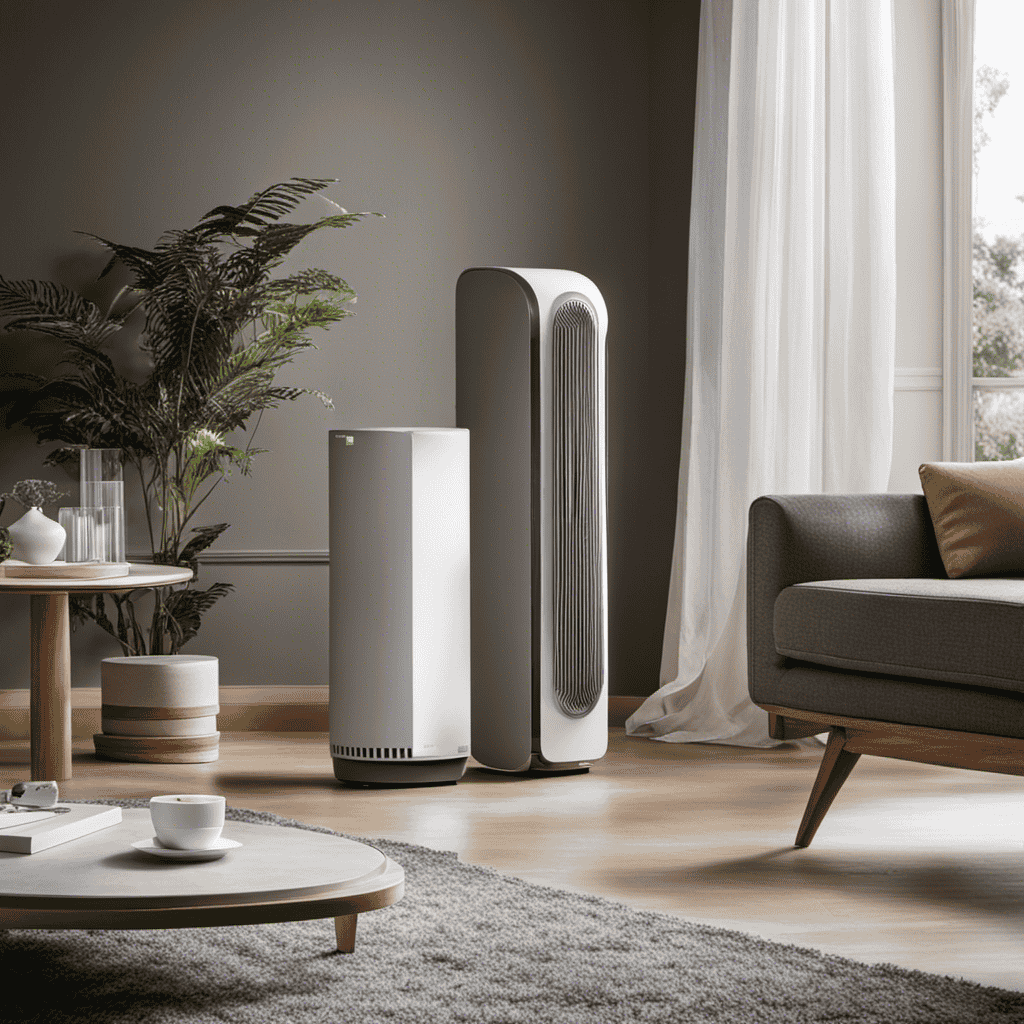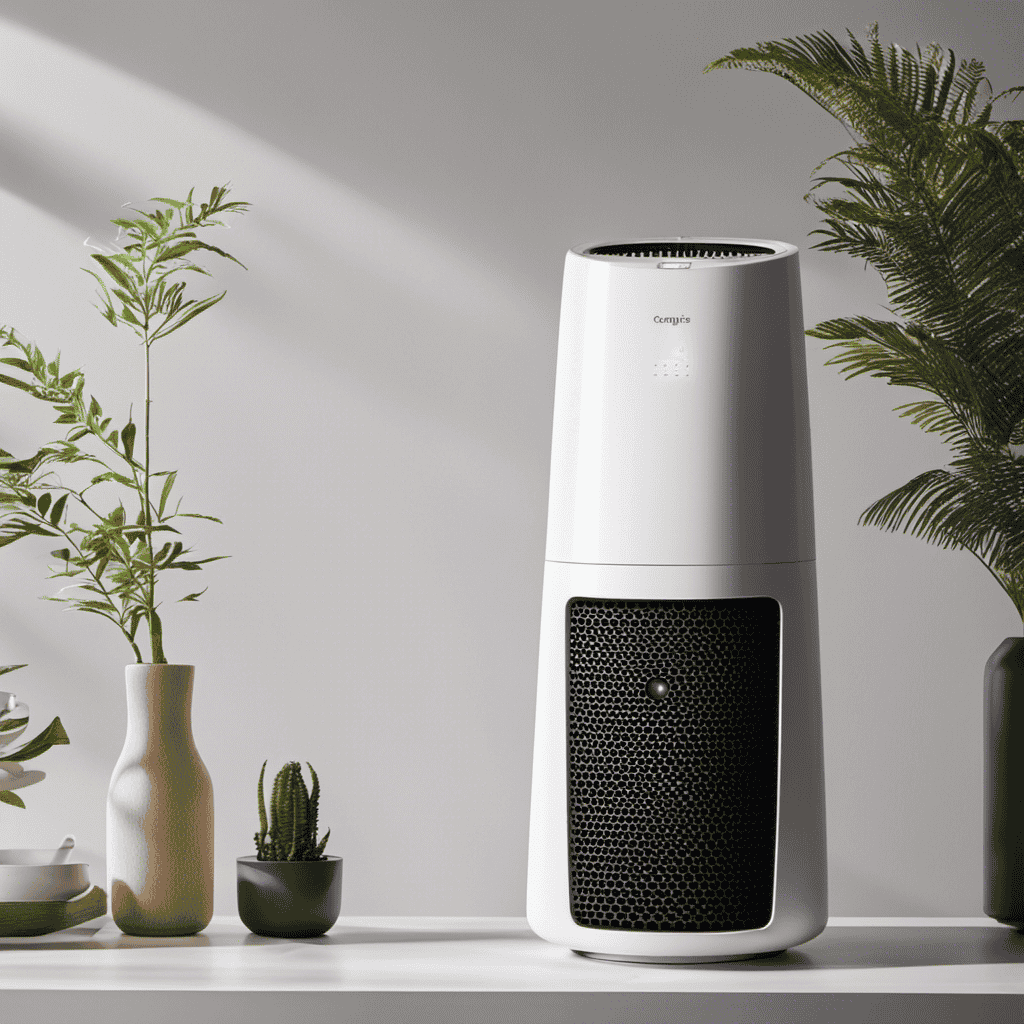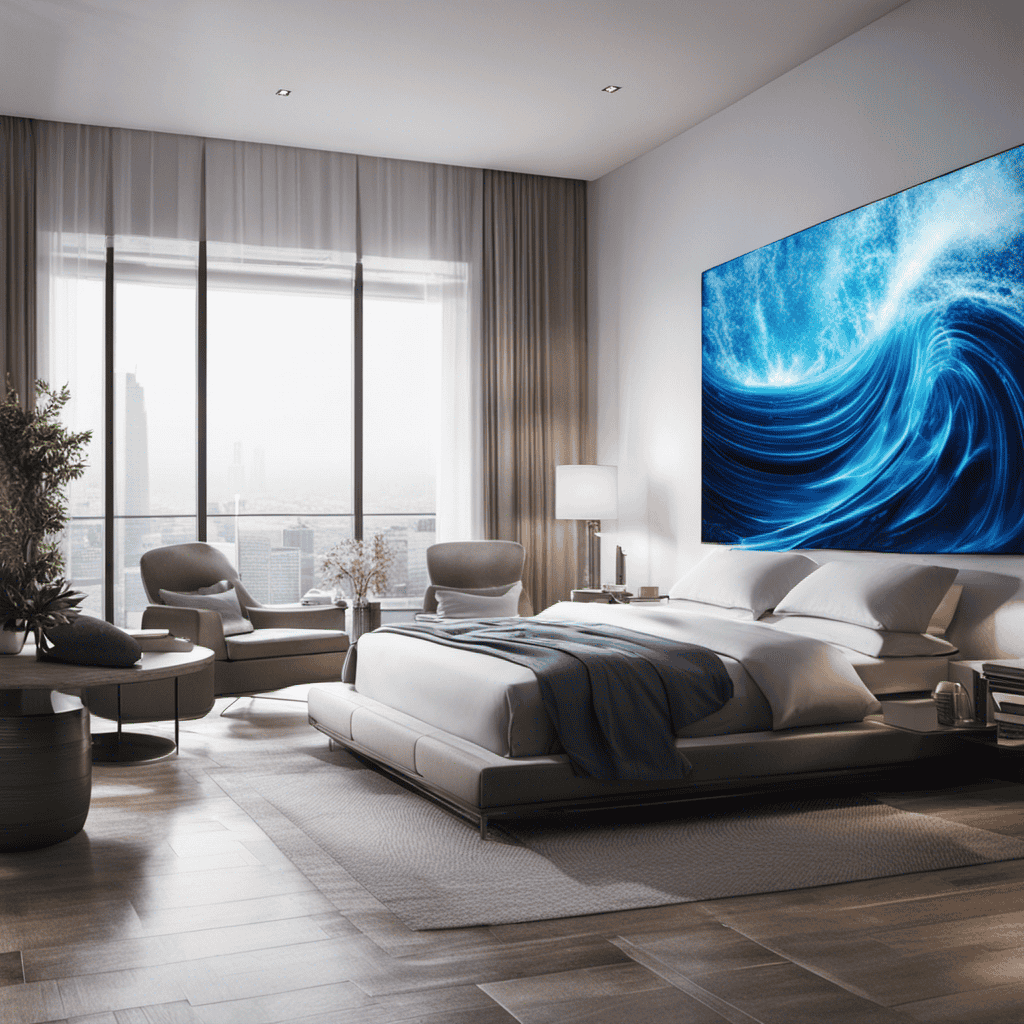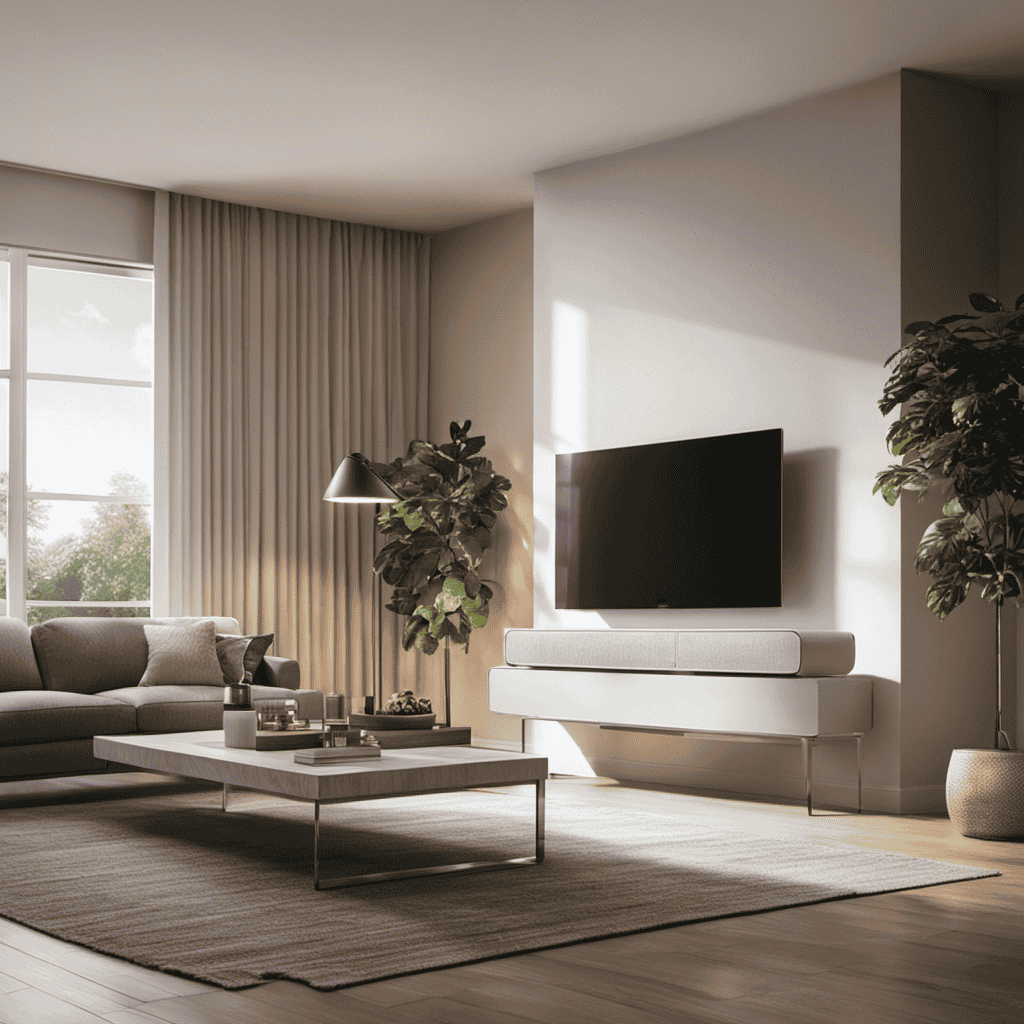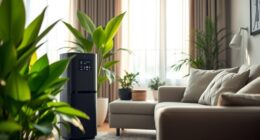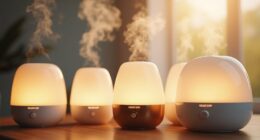As a person who is looking to enhance the air quality in my home, I frequently ponder the expenses associated with operating an air purifier.
In this article, I will delve into the factors to consider, such as energy consumption and recommended daily usage.
By providing a cost analysis and examining the impact on air quality, I aim to equip you with the necessary information to make an informed decision.
Additionally, I will share tips for efficient usage to maximize the benefits of your air purifier.
Key Takeaways
- Consider the size of the air purifier to ensure optimal efficiency and avoid wasting energy.
- Take into account the noise level of the air purifier, especially in spaces like bedrooms or offices.
- Adjust the settings and usage of the air purifier based on the environment needs to save on energy consumption.
- Regularly clean or replace filters to maintain the effectiveness of the air purifier and improve air quality.
Factors to Consider
When deciding on an air purifier, there are several factors to consider. Two important factors to pay attention to are the size of the air purifier and its noise level.
The size of the air purifier is crucial because it determines its efficiency in purifying the air in a given space. A purifier that is too small for the room will not be able to effectively clean the air, while one that is too large may consume unnecessary energy. It is essential to choose an air purifier that matches the size of the room for optimal performance.
Additionally, noise level is another aspect to consider. Some air purifiers can produce loud noises during operation, which can be disruptive, especially in bedrooms or offices. Therefore, selecting a purifier with a low noise level is important to ensure a peaceful and productive environment.
Energy Consumption
To save on energy, you should consider how long you’ll be using the purifier each day. Energy efficiency is an important factor to consider when it comes to air purifiers. These devices typically consume electricity to operate and can contribute to your overall energy consumption.
The amount of electricity an air purifier uses depends on various factors, such as the size and power of the unit, as well as the settings you choose. It’s important to check the energy efficiency rating of the purifier and select a model that meets your needs while minimizing electricity consumption.
Recommended Daily Usage
When it comes to optimal air purification, there are several key points to consider.
First, it is important to choose an air purifier that is appropriate for the size of the room you are using it in.
Additionally, regularly changing the filters and keeping the unit clean will ensure that it is functioning at its best.
In terms of cost-effective usage tips, running the air purifier on a lower setting or using it only when necessary can help to conserve energy and save on electricity bills.
Optimal Air Purification
The best way to ensure optimal air purification is by regularly cleaning or replacing the filters. This is crucial for maintaining air purifier effectiveness. Over time, filters can become clogged with dust, allergens, and other particles, reducing their ability to effectively clean the air.
By cleaning or replacing the filters according to the manufacturer’s instructions, you can ensure that your air purifier is operating at its best.
Additionally, it is important to consider the noise levels of the air purifier. Some models can be quite loud, which can be disruptive, especially in quieter environments or during sleep. When selecting an air purifier, look for models with lower noise levels or features such as a sleep mode to minimize disturbance.
Transitioning into the subsequent section about cost-effective usage tips, it is important to consider factors such as energy consumption and filter lifespan.
Cost-Effective Usage Tips
For more cost-effective usage, you should consider adjusting the settings on your air purifier based on the specific needs of your environment. By doing so, you can extend the air purifier’s lifespan and save money in the long run.
One budget-friendly option is to use the air purifier only when necessary, such as during high pollen or pollution seasons. Another option is to lower the fan speed or use the energy-saving mode, which reduces power consumption without compromising air quality.
Additionally, regularly cleaning or replacing the filters can improve the efficiency of the air purifier, ensuring it works optimally for a longer period.
It’s important to note that each air purifier model may have different settings and recommendations, so referring to the manufacturer’s instructions is crucial for achieving the best cost-effective usage.
Health Benefits Explained
Now that we’ve discussed some cost-effective usage tips for air purifiers, let’s delve into the health benefits they provide. Air purifiers play a crucial role in improving air quality, which has a direct impact on our respiratory health.
By removing harmful pollutants and allergens from the air, air purifiers can help alleviate symptoms of respiratory conditions such as asthma, allergies, and chronic obstructive pulmonary disease (COPD). Additionally, they can help reduce the risk of respiratory infections by trapping bacteria and viruses.
To highlight the impact of air purifiers on respiratory health, let’s take a look at the following table:
| Air Quality Improvement | Respiratory Health |
|---|---|
| Removes pollutants | Alleviates asthma |
| Filters allergens | Reduces allergies |
| Traps bacteria/viruses | Lowers infection risk |
As you can see, air purifiers not only improve air quality but also have a significant positive impact on our respiratory health.
Cost Analysis
When considering the cost analysis of an air purifier, there are three key points that need to be investigated.
First, we need to compare the energy consumption of different air purifiers. This will help us determine which ones are more energy efficient and therefore more cost-effective in the long run.
Second, we should evaluate the long-term cost effectiveness. This will help us understand if the initial investment in an air purifier is worth it in terms of the savings it can provide over time.
Lastly, we need to assess the maintenance expenses. This will allow us to determine the additional costs associated with owning and operating an air purifier.
Energy Consumption Comparison
The energy consumption of air purifiers varies depending on the model and features. When considering the energy usage of an air purifier, it is important to look for energy-saving features that can help reduce electricity costs. Some models come with features such as energy-efficient motors or adjustable fan speeds, which can help lower energy consumption.
Additionally, noise levels can vary between different air purifiers. It is advisable to compare noise levels before making a purchase, especially if you plan to use the air purifier in a bedroom or office space where noise can be a concern. Considering both energy-saving features and noise levels is crucial when selecting an air purifier that meets your needs.
Transitioning into the next section about long-term cost effectiveness, it is also important to consider the overall operating costs of an air purifier over time.
Long-Term Cost Effectiveness
One important factor to consider when selecting an air purifier is its long-term cost effectiveness. In order to determine this, a cost benefit analysis should be conducted, taking into account the initial purchase cost as well as the ongoing operational expenses.
When looking for cost saving measures, it is essential to consider the energy consumption of the air purifier. Energy-efficient models may have a higher upfront cost, but they can save you money in the long run by reducing electricity bills.
Additionally, some air purifiers come with replaceable filters that need to be changed regularly. Opting for models with washable or reusable filters can significantly reduce maintenance costs.
Maintenance Expenses Evaluation
Opting for models with reusable filters can significantly reduce maintenance costs. When evaluating the expenses associated with air purifiers, it is important to consider the cost of filter replacement. Reusable filters can be cleaned and reused multiple times, saving you money in the long run.
Here are three reasons why choosing models with reusable filters can be beneficial:
-
Cost savings: Replacing filters can be a recurring expense, especially if you live in an area with poor air quality. Opting for reusable filters means you won’t have to constantly purchase new ones, reducing your maintenance costs.
-
Environmental impact: By using reusable filters, you are reducing the amount of waste generated. Disposable filters contribute to landfill waste, while reusable filters can be cleaned and used again, minimizing environmental impact.
-
Filter effectiveness: Reusable filters are designed to effectively capture and remove airborne particles, ensuring that your air purifier continues to provide clean air for your home.
Considering the cost savings, environmental impact, and filter effectiveness, choosing models with reusable filters is a smart choice. Not only will it save you money in maintenance costs, but it also has a positive impact on air quality.
Impact on Air Quality
To improve your air quality, you should consider running an air purifier. Indoor pollutants can have a significant impact on our health, and an air purifier can help remove these harmful particles from the air we breathe.
Studies have shown the effectiveness of air purifiers in reducing indoor pollutants, such as dust, pollen, pet dander, and mold spores. These devices work by using filters or other technologies to capture and trap these particles, preventing them from circulating in the air. In fact, a study conducted by the Environmental Protection Agency (EPA) found that air purifiers can reduce indoor air pollution levels by 50% or more.
By running an air purifier regularly, you can create a healthier and cleaner environment for you and your family.
Now that you understand the impact of air purifiers on air quality, let’s move on to some tips for efficient usage.
Tips for Efficient Usage
If you want your air purifier to work more efficiently, make sure to clean or replace the filters regularly. This ensures that the air flowing through the purifier is properly cleaned and free from pollutants.
In addition to this, there are a few other tips to optimize the usage of your air purifier:
-
Look for energy-saving features: Some air purifiers come with energy-saving modes or timers that can help reduce electricity consumption. These features allow the purifier to operate at a lower power setting when the air quality is good, saving energy and reducing your electricity bill.
-
Consider noise reduction techniques: Air purifiers can sometimes produce noise, especially when running at higher speeds. Look for models that have noise reduction technologies or adjustable fan speeds to minimize noise levels. This is particularly important if you plan to use the air purifier in your bedroom or office, where silence is crucial.
-
Place the purifier strategically: To maximize the efficiency of your air purifier, place it in a central location where it can effectively circulate purified air throughout the room. Avoid placing it near obstacles like furniture or curtains that may obstruct the airflow.
What Factors Affect the Cost of Running an Air Purifier?
When it comes to air purifier running costs, several factors can influence the overall expense. The size of the room, frequency of use, and the type of air purifier all play a role in determining the ongoing costs. Additionally, the price of replacement filters and energy efficiency are also key considerations.
Frequently Asked Questions
Can Running an Air Purifier Improve My Overall Health?
Running an air purifier can improve overall health by reducing allergies. It is recommended to run the purifier continuously for optimal results. Scientific evidence supports the benefits of air purifiers in creating a healthier indoor environment.
What Are the Potential Side Effects of Using an Air Purifier for an Extended Period?
I’ll discuss the potential risks and long-term effects of using an air purifier for an extended period. It’s important to consider these factors to ensure the safety and effectiveness of using an air purifier.
Will Running an Air Purifier Help Reduce the Spread of Airborne Viruses?
Running an air purifier can help reduce airborne transmission of viruses. It filters out particles, including viruses, from the air, improving indoor air quality. However, the effectiveness may vary depending on factors such as the size of the room and the type of air purifier used.
Are There Any Specific Air Purifier Brands or Models That Are More Energy-Efficient Than Others?
There are several energy-efficient air purifier brands available. Using an air purifier has many benefits, such as reducing allergens and improving air quality. It’s important to research and choose a model that fits your needs and budget.
Can I Use an Air Purifier in Conjunction With Other Ventilation Systems, Such as Opening Windows, for Better Air Quality?
Yes, you can use an air purifier in conjunction with other ventilation systems like opening windows. This can help improve air quality by increasing the circulation of fresh air and reducing the concentration of allergens.
Conclusion
In conclusion, running an air purifier can be likened to a vigilant gardener tending to their precious plants. By considering factors such as energy consumption, recommended daily usage, and cost analysis, we can ensure efficient usage and maximize its benefits.
Scientific evidence shows that air purifiers can significantly improve air quality, reducing the presence of harmful pollutants.
So, let us embrace the role of the air purifier as our trustworthy garden caretaker, ensuring fresh and clean air for a healthier and happier home.
